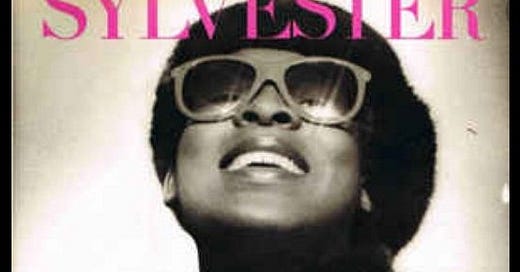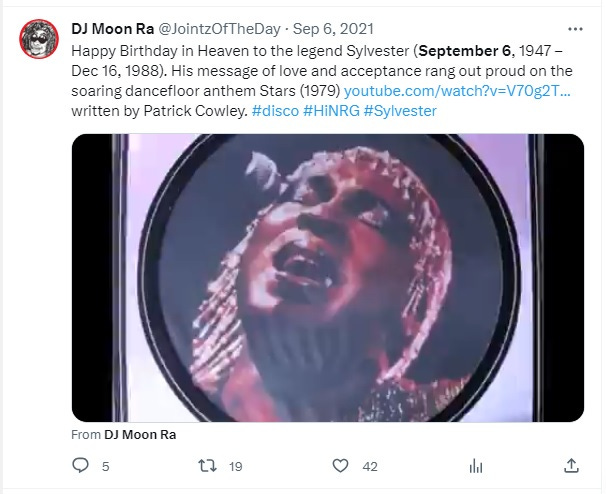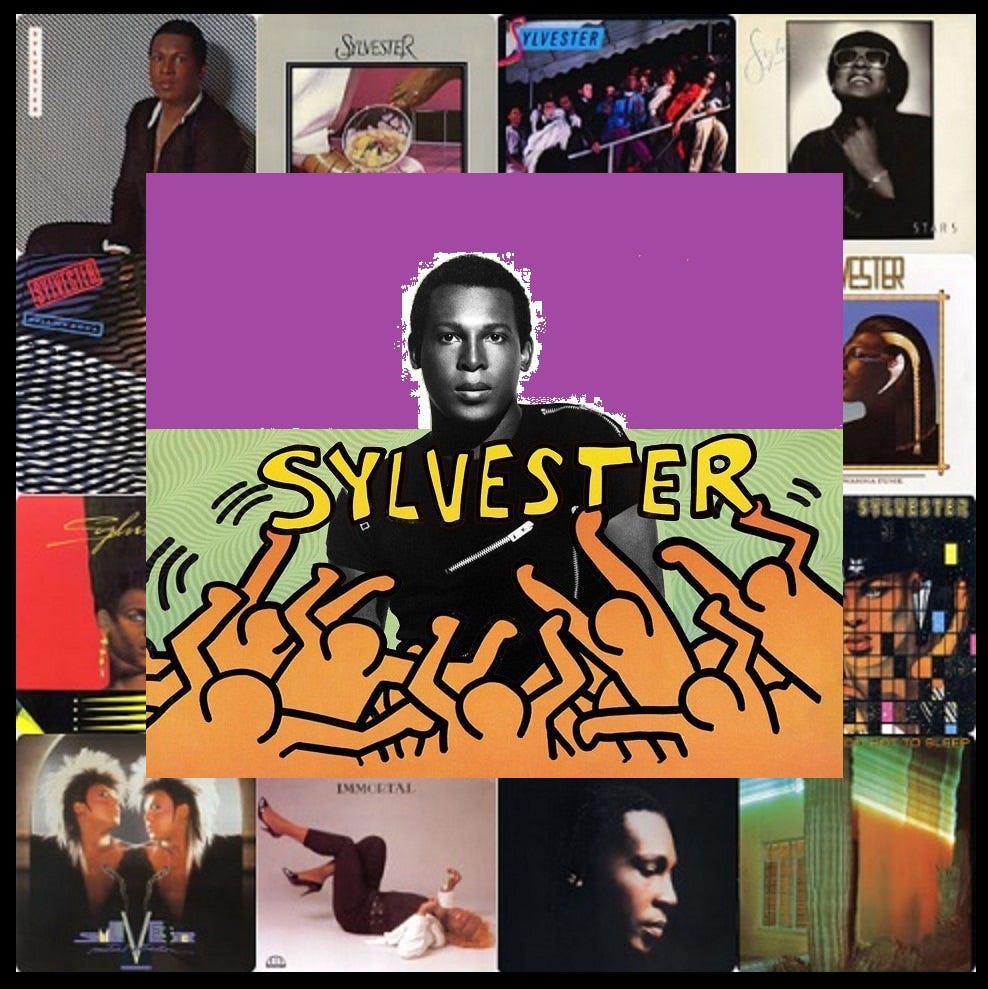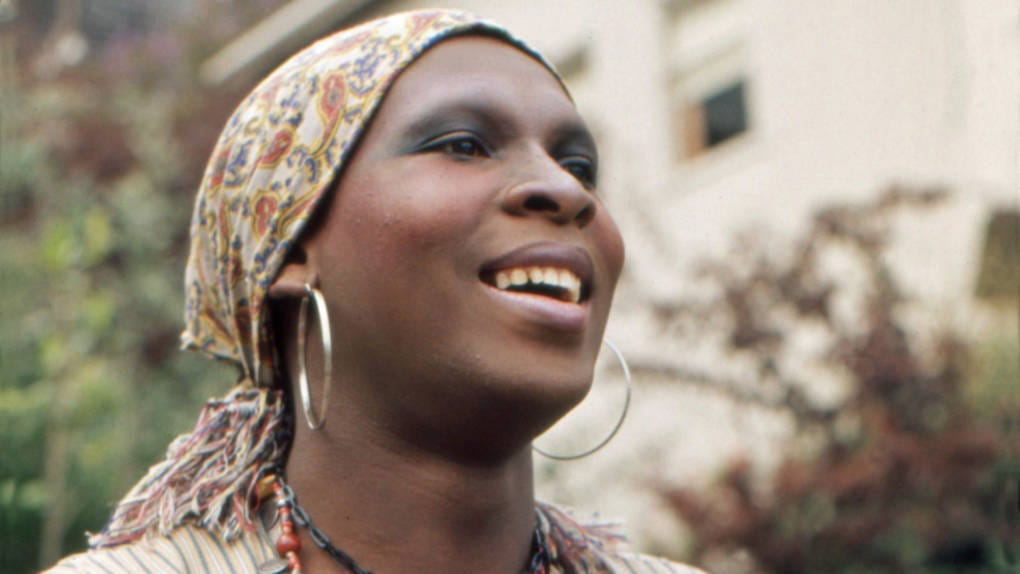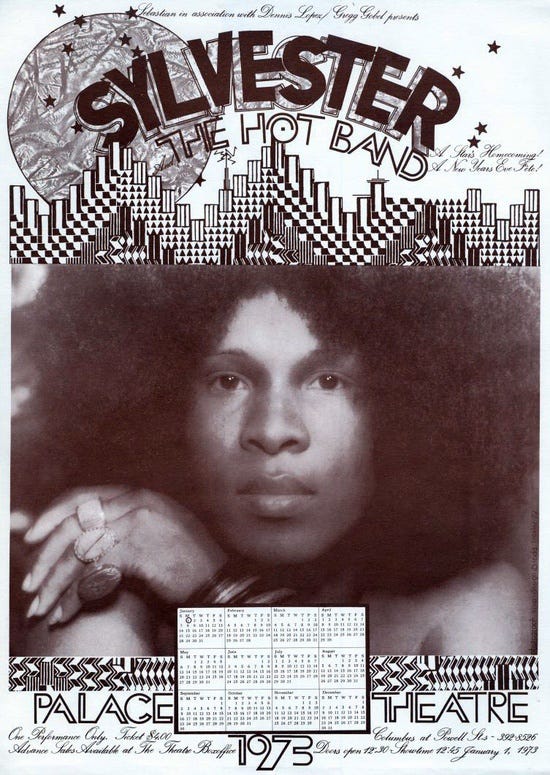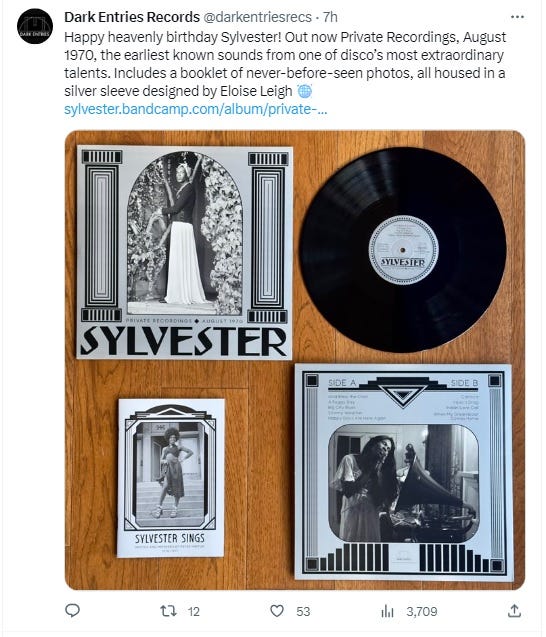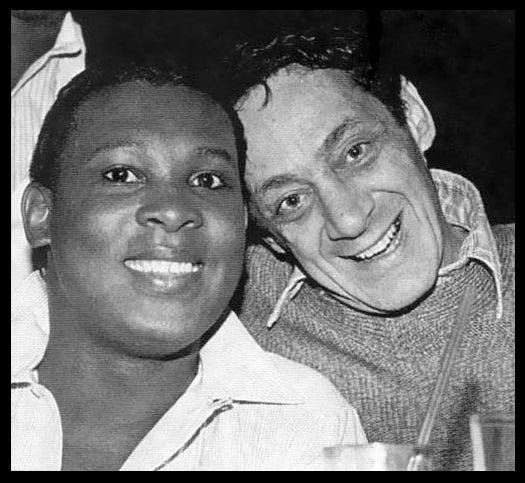Sylvester (September 6, 1947 – December 16, 1988) – Stars (1979)
Written by Sylvester's frequent collaborator and keyboardist Patrick Cowley, this dancefloor anthem had a powerful message of love and acceptance.
Watch full video on Twitter.
View most updated version of this post on Substack.
Sylvester James Jr. was a pioneering singer/songwriter who became a queer disco icon as the first nationally prominent recording artist who was Black, openly gay, and an androgynous cross-dresser.
Born in the Watts section of Los Angeles, he started singing gospel at age three in his mother’s Pentecostal church choir. His father, who Sylvester was named for, abandoned their family when Sylvester was still a child. When he was eight years old, he was raped by an adult male church member rumored to have been the organist. Sylvester always claimed this had been a consensual act. The congregation’s disapproval of his homosexuality grew over the next few years, and he finally left the church at age 13.
He also left home, and as a teenager began frequenting the city’s gay bars. He and a group of Black gay friends formed a group known as the Disquotays. They threw elaborate drag parties around South Central, sometimes at the home of their friend, the R&B singer Etta James.
Sylvester moved to San Francisco in 1970 when he was 22. There he joined the avant-garde drag theater troupe The Cockettes, which he subsequently left in November, 1971 to pursue a solo career after a disastrous three-week run of shows in New York made him realize their collective lack of professionalism was holding him back.
Sylvester in San Francisco, 1971.
Rolling Stone editor Jann Wenner convinced A&M Records to finance a demo record, for which Sylvester assembled a band of straight white musicians dubbed the Hot Band. The material was deemed too uncommercial to release, but they began performing together as Sylvester & the Hot Band and eventually put out two unsuccessful albums on Blue Thumb Records.
Sylvester always saw himself as male and adopted an androgynous look in the early seventies, moving away from the more feminine outfits he had previously worn. After he and the Hot Band opened for a still little known David Bowie in 1972 at the Winterland Ballroom, a poorly attended gig, Bowie told a reporter San Francisco didn’t need him because “They've got Sylvester.” It was an off-the-cuff comment, but recognized a deeper truth that his androgyny was an integral part of who Sylvester was, not largely a costume like it was for Bowie. In 1986, when he appeared on the New Year's Eve edition of The Late Show Starring Joan Rivers and Rivers called him a drag queen, he told her, “I’m not a drag queen, I'm Sylvester!"
Following the breakthrough success of his fourth album Step II, which hit #7 on the R&B album charts in 1978 and went gold on the strength of its disco hits “You Make Me Feel (Mighty Real)” and “Dance (Disco Heat),” Sylvester released his masterpiece Stars LP in 1979. He co-produced it with former Motown producer Harvey Fuqua, who had signed him to Fantasy Records two years earlier in 1977. In interviews he said Stars was his first all-disco record, but that it would probably also be his last. He wanted audiences to appreciate his range as a singer and performer, and refused to be categorized as only a disco artist.
Sylvester’s friend and collaborator Patrick Cowley, the synthesizer wizard who had joined his band during the recording of Step II, wrote two epic songs for Stars. The title track was a dancefloor anthem for the ages, with a message of love for one’s self and each other.
“Everybody is a star…Everybody is one…You're a star…And you only happen once. Take a look around, tell me what you see…Sisters and brothers, feeling high, feeling free.”
Released as the album’s lead single in January, 1979, “Stars” did not make the U.S. R&B charts or Billboard Hot 100, although it hit #4 on the dance charts along with the album’s other three tracks. It also reached #47 on the UK Singles Chart.
The other cut Cowley wrote for Stars was the proto-techno masterpiece “I Need Somebody To Love Tonight.” It epitomized the dark, after hours sound that would come to be known as “sleaze” disco.
Cowley’s even more haunting demo instrumental version was released in 2015 by Dark Entries Records, the San Francisco-based label that has tirelessly worked to introduce Cowley and Sylvester’s legacies to today’s listeners.
Today, on what would have been his 76th birthday, Dark Entries released a new compilation of Sylvester’s earliest known tracks, described by the label as “an intimate collection of vintage jazz, blues, and gospel.” Private Recordings, August 1970 is available for purchase on Bandcamp.
As the eighties dawned, Sylvester released the albums Sell My Soul (1980) and Too Hot To Sleep (1981). True to what he had told the press when promoting Stars, neither was a disco LP. The material on both albums ranged from soul to gospel, and represented his attempts to stretch as an artist. Neither sold well, although the entire Sell My Soul LP reached #6 on dance charts.
In 1981, Sylvester and his backup singer Jeanie Tracy provided vocals for Herbie Hancock’s very funky disco single “Magic Number.” Co-written by Hancock and producer David Rubinson, the track went to #9 on dance charts and #59 R&B.
Sylvester fell sick with AIDS in late 1987, following the death of his boyfriend Rick Cranmer that September of complications from the virus. Jeanie Tracy became his caregiver while he lost weight, gave away his possessions, and gradually became weaker and weaker. He also gave a series of interviews to the media in which he candidly discussed being openly gay and dying of AIDS, helping to dispel the stigma and fear surrounding the disease at that time.
Sadly, Sylvester died on December 16, 1988, gone far too soon at age 41. In his will, he bequeathed all royalties from the future sale of his music to two HIV/AIDS charities, Project Open Hand and the AIDS Emergency Fund.
Rest in Power, Sylvester James.
Further info:
“Songs We Love: Patrick Cowley, 'Somebody To Love Tonight',” by Piotr Orlov, NPR Music, September 8, 2015.
“How the World Caught Up to Sylvester,” by Nastia Voynovskaya, KQED, April 11, 2019.
“Sylvester, queer disco trailblazer, finally gets his due,” Los Angeles Times, June 16, 2023.
#disco #soul #PatrickCowley #Sylvester


